Reflections of participants for continuing the dialogue
Professor Ferre Laevers from the Leuven University was not the only one who shared his initial reflections within a few days after the Symposium Unfolding Human Potential, which took place on the 8th & 9th of February 2017 in The Netherlands. It starts with a short intro on this page, the complete article can be found in the PDF-link.
There is a lot I can’t let go, a lot that spoke to me and still is on my mind. I feel an urge to linger on these experiences, words and meanings.
We received contributions from the following particapants:
- Luc Stevens (NIVOZ)
- Linda O’Toole/Daniel Kropf (Learning for Well-being)
- Ferre Laevers
- Rebekah Rousi
- Monique Leijgraaf
- Thieu Besselink
- Wouter Pols
- Joop Berding
- Hester IJsseling
- Ruth Besselink
- Corina van Doodewaard
- Lisette Bastiaansen
- Aziza Mayo
- José Hofman
- Simon Verwer
Hartger Wassink and Shanti George: How the symposium broke new ground in its use of dialogue and short films that highlighted inspiring practice.
Maaike Nap’s reflections on: What lies at the heart of student-teacher interaction, reflections that capture the essence of the symposium.’
Jean Gordon and Shanti George: ‘Unique potential’ as ‘meaning and purpose in all our endeavours.’
© All published in the Learning for Wellbeing-magazine, articles that takes the conversation between Nivoz and L4WB further.‘

----
* Luc Stevens (NIVOZ)
‘On behalf of NIVOZ and the editors, I generously encourage you begin reading, pondering, thinking and acting’
I may easily credit each individual speaker or participant for his or her particular contribution, but readers will surely find their very own nuggets of gold in the various articles that have been published. Furthermore, I would rather acknowledge the shared effort by means of which all individual contributions were brought forth and often lifted beyond their initial meaning. In that sense, I witnessed several instances of Unfolding Human Potential in the course of our two days together. On behalf of NIVOZ and the editors, I generously encourage you begin reading, pondering, thinking and acting.’
Read more from Luc Stevens
Luc Stevens is founding father of NIVOZ. In the practice of education and child raising – beleaguered as it often is by political, social and economic claims – there is an increasing need for pedagogical thinking, pedagogical reflection and meaningful pedagogical theory. The NIVOZ Institute is one of the pivotal places in the Netherlands to address and supply this need.
* [email protected]
 * Linda O’Toole and Daniel Kropf (L4WB)
* Linda O’Toole and Daniel Kropf (L4WB)
‘The collaboration was generative, inspiring and joyful, creating opportunities that were unforeseen‘
Having experienced a sense of wholeness through the event, there is little to say. Still, as Learning for Well-being (L4WB), we would like to offer some brief reflections on certain elements that we saw expressed and that we think it is important to remember, to celebrate, and to continue to grow. The theme of the symposium – Unfolding Human Potential: a dialogue on core qualities and practices – provides a framework for addressing some of these elements by considering the following phrases: unfolding, human potential, dialogue, core qualities and practices.
Read more from Linda O’Toole and Daniel Kropf
Daniel Kropf is the Founding Chair and Executive Director of the Universal Education Foundation (UEF). Linda O’Toole is a consultant to UEF which functions as a catalyst for the Learning for Well-being community.
* [email protected]
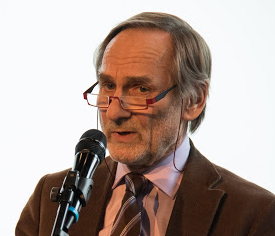 * Ferre Laevers
* Ferre Laevers
‘What spoke to me and what made me think further…’
Upfront are three clusters of meanings that I feel most enriched with when reflecting on of the Symposium.
- How ‘narratives’ bring the whole person in
- How far ‘sharing responsibility’ can go
- How Wise Men and Wise Women can awaken us
Read more from Ferre Laevers
professor at Leuven University
* [email protected]
 * Rebekah Rousi
* Rebekah Rousi
People, earth, dissonance and deep learning
From my personal experience and background in visual arts and critical theory, the mess is an essential element in initiating the learning and exploration process. Unease of the uncertain bring us to theorise, reflect, test, challenge, and reflect again. It is never a process of finding an answer, and drawing a complete understanding, although we might have those moments or epiphanies in which we feel we understand, but rather it is a process of constantly picking, scrutinizing and performing elements then organically moving onto the next issues.
Read more from Rebekah Rousi
Postdoctoral Researcher, Cognitive Science
Department of Computer Science and Information Systems
University of Jyvaskyla, Finland
* [email protected]
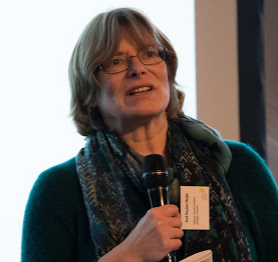 * Monique Leijgraaf
* Monique Leijgraaf
Keep the questions going
I think that it’s our job as teacher educators not to create harmony, but to create what one of the attendants of the conference called a safe haven for unsafe learning. It’s our job to explicitly not iron out the complexity of education, but to create dissonance in a safe educational setting. This argument presupposes that teacher education is not about creating answers for (student) teachers, but about “keeping the questions going,” as Colleen McLaughlin put it. The most central aspect of teacher education is to create a process of self-inquiry which is quite systematic and which keeps teachers forever asking questions. As a teacher educator, you’re more like a Socratic gadfly than the omniscient expert.
Read more from Monique
Monique Leijgraaf is a teacher Educator and Researcher on Diversity & Critical Citizenship University of Applied Sciences iPabo, Amsterdam
* [email protected]
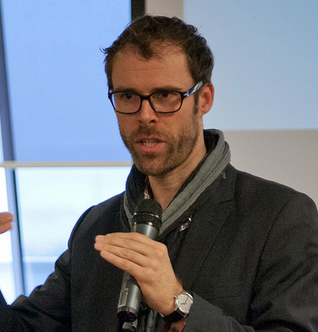 * Thieu Besselink
* Thieu Besselink
Teaching for human unfolding in a time of fundamental questioning
I recently attended the Unfolding conference in Driebergen of NIVOZ and the Learning for Wellbeing foundation. We saw many practices of teachers and educators getting to grips with something I would call the emergent nature of human unfolding. For anyone at home in educational history imagines of a romantic Rousseauian movement cropped up (see Maarten Huygen in NRC of Feb 13). Understandably so, because much of the conversations concerned the conditions for the child’s autonomy, and the teacher’s role not as expert but as enabling partner in meaning making. But what emerged from the Unfolding conference was not a romantic idea at all.
Read more from Thieu Besselink
Founder of The Learning Lab, Developer of De Nederlandse School, Laureate of the European Leonardo Award
* [email protected]
* Wouter Pols
‘A renewed coming into the world of pedagogy’
One doesn’t approach an upcoming event without expectations, without an idea what will happen. Arriving at the UEF/NIVOZ symposium in Driebergen, I expected not only reports of educational experiences, but educational words as well: words to understand what those experiences mean.
And indeed, that happened.
Read more from Wouter Pols
teacher-educator at Hogeschool Rotterdam, and author.
* [email protected]
* Joop Berding
If we don’t take the ‘whatfor’ into account, the ‘how’ will be instrumental
The idea, or fact, that no one on his or her own can oversee reality, whatever that is, is a good reason to come together with as many people as possible, and share as many and diverse experiences, and insights as possible. Or to use a phrase of Hannah Arendt: ‘to go visiting’ eachother’s experiences, meanings and ‘theories’. And this is what we did on those two days at the NIVOZ / L4WB symposium.
Read more from Joop Berding
Assistent professor at the School of Social Work, researcher at the Research Center Urban Talent, both at Rotterdam University of Applied Sciences, The Netherlands, and author.
* [email protected]
* Hester IJsseling
I experienced the Unfolding as 'a safe haven for unsafe learning’
What a teacher needs is not certainty, but rather, negative capability, to use a concept of Keats, the poet: that is, “when one is capable of being in uncertainties, mysteries, doubts, without any irritable reaching after fact and reason”. As Colleen McLaughlin said, we should create spaces in schools where teachers feel respected, safe and valued, and where they can find ways to talk to each other about their lived experience, without needing to fear some kind of assessment.
Read more from dr. Hester IJsseling
Teacher/philosopher/educational researcher. Organisation: Primary School De Kleine Reus, Amsterdam.
* [email protected]
* Ruth Besselink
A relationship is the only sensible response to the deep complexity of the human unfolding
What is between the lines becomes observable in a narrative. One narrative of Unfolding for me is that we are reminded of our most human qualities of intuition, trust and relationship, and found there in the instruments for bringing balance in what the child needs and what the educator needs. I don’t believe we need a new language but just to be more nuanced and responsible in our expression. This means we have no ready answers. Not to the students, not to the teachers, and perhaps not to whom we are accounting to. A relationship is not a tangible response, but it is the only sensible response to the deep complexity of the human unfolding.
Read more from Ruth Besselink
Ruth is art therapist & student master educational needs
* [email protected]
* Corina van Doodewaard
Ways and a will to reach out – to withstand the eroding of connectedness
It was an inspiring bubble, those two days, but it also made me realize that this bubble can’t make the difference. Our jobs are ‘out there’; where dilemma’s and conflicts of values challenge me on a daily base. I feel empowered ánd challenged by the conference to create such little ‘bubbles’ in my own spaces, with my own colleagues and students. Connect and create free spaces to share doubts, cherish dilemma’s and …dare to fail, bravely, together!
Value connectedness as a source of life…
Read more from Corina van Doodewaard
Corina is a PhD-researcher. Institute: Calo- Hogeschool Windesheim. Bachelor: Physical Education Teacher Education. Master: Physical Education and Sport Pedagogy. Function: Senior lecturer Physical Education and Sport Pedagogy
* [email protected]
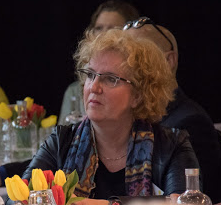 * Lisette Bastiaansen
* Lisette Bastiaansen
What do we mean by ‘seeing’ the pupil? That is not an easy question to answer
But what do we mean by ‘seeing’ the pupil? That is not an easy question to answer. For me it at least implies that you, the teacher, are ‘attentively involved’ with the pupils’ present – in order to be able to ‘see’ clearly what his needs and longings in the ‘here and now’ are. But it also means that you – at the same time – have an attentiveness for the pupils’ future – by seeing who is not yet there, but might emerge in the ‘there and then’. This combined way of ‘seeing’ is easier said than done, because it does not only require dare devilled teachers, it also requires different forms of attentiveness and the ability to use the right form at the right time.
Read more from Lisette
Lisette Bastiaansen is PhD student University of Humanistic Studies
Lecturer higher education
* [email protected]
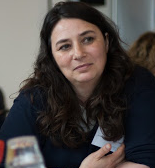 * Aziza Mayo
* Aziza Mayo
We became co-authors of the narrative of unfolding human potential
I was particularly inspired by the dialogues we had at our tables. These dialogues made it so clear that education is not an economic or predictable process but a truly human experience. Creating a dialogue made it necessary for us to really listen at what others were saying. It required us to sometimes hold back our initial convictions, beliefs and feelings. Rather than automatically responding to what was being said with our personal understandings, we tried to bring to the surface the understandings of each participant through open questions and to create from this a shared understanding.
Read more from Aziza
Aziza Mayo is lector Waarde(n) van Vrijeschoolonderwijs at Hogeschool Leiden.
* [email protected]
 * José Hofman
* José Hofman
The language we use, unknowingly and unintentionally, steers views and ways we deal with practise
One of the things I take home is the importance of language. Being a advisor in a organisation for primary and secondary education each day I talk with schoolleaders, boardmembers and supervisors about improving and innovating schools. I often write about it. Thanks to the reflections of Tone Saeve and Ferre Laevers (first chapter) I am more aware of the fact that the language we use, the language I use, unknowingly and unintentionally steers views and ways we deal with practise.
Read more from José
José Hofman is an advisor of stichting BOOR in Rotterdam
* [email protected]
* Simon Verwer
Hoe realiseer je al die mooie pedagogische waarden in systemen en concrete organisaties?
Lees meer van Simon Verwer
Simon Verwer is docent op het Hyperion Lyceum in Amsterdam.
* [email protected]

